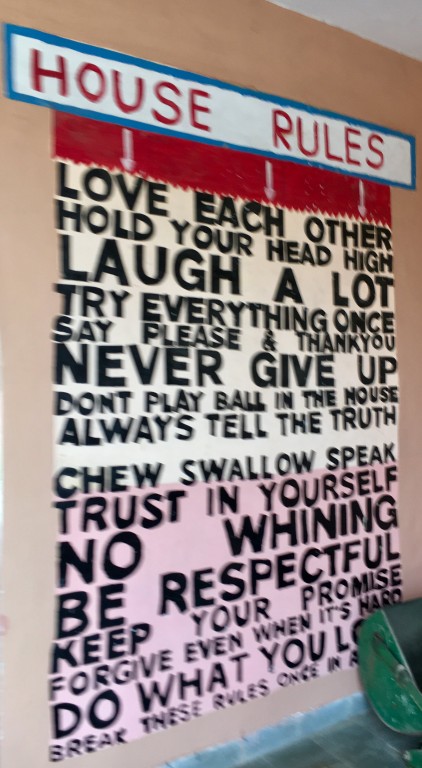
A child’s artwork displayed in a notebook – a parting gift from Udayan Care. It reads, "Life is beautiful and colorful in Udayan Care."
Published August 28, 2017, last updated on October 10, 2017 under Voices of DGHI
By Anika Agarwal, junior biology and global health major
This summer, through DGHI’s Student Research Training (SRT) Program, my three teammates and I had the opportunity to spend two months in New Delhi, India working with Udayan Care.
Our preparation for this endeavor began in December 2016. We had months of faculty advisor and SRT meetings learning about cultural humility, project management, ethical considerations in international work, methods and design. We also had frequent Skype meetings with our community partners, in which we shared expectations, practical project goals and hopes for the summer.
Nothing, however, could have fully prepared us for the life-changing experience of working in the field.
Since 1994, Udayan Care has been working to provide homes for orphaned and abandoned children across nine states in India. Each home, or “ghar,” houses an average of 15 children who are looked after by a dedicated staff of caregivers, social workers and mentor parents. Our team’s primary goal during this fourth year of collaboration between DGHI and Udayan Care was to continue collecting longitudinal and cross-sectional mental and physical health data through interviews with the Udayan children.
Each day, we had the opportunity to visit the Udayan ghars to meet these amazing children and learn about their daily lives, relationships with others and perceptions of themselves. From these interviews and my interactions with each child, I learned valuable lessons about resilience and empowerment.
Many children I had the chance to meet have faced abuse, abandonment, trauma and loss. I found it inspiring and uplifting that the children greeted us with smiling faces and excitement at every ghar, despite the great adversities they’d experienced. Without fail, we were treated to jokes, dancing and singing performances, teasing about our accents and inquisitive questions about the project work.
Whenever we brought snacks for the children, they always demanded that they be able to share some with us as well. This kindness and enthusiasm is unceasing, even as each child struggles to find a place in their ghar, keep up with schoolwork and work through mental health issues.
One seventeen-year-old girl, anxious about her future and on the verge of graduating from Udayan Care, told me that if she could change one thing about the past, it would be that she did not lose her parents. After a moment of contemplation, however, she revised this statement and said that she would not change anything; in the end, all of her past experiences had led her to her Udayan family.
I was amazed that even after such heartbreak, she was able to make the best of her situation. I will forever admire that in the face of a difficult past, imposing present and uncertain future, the Udayan children remain resilient and courageous.
One of my first interviews was with a nine-year-old boy whose parents had never sent him to school. In fact, many children in Udayan Care did not have the chance to attend school until they became part of the Udayan family. Despite this late start, Udayan Care’s cultural commitment to scholarship and providing opportunities has allowed its children to follow their dreams, seek higher education, and live independently as adults.
During my interviews with Udayan Care alumni, I was surprised and moved to learn that many found no trouble during the transition from living in the Udayan Ghars to independence as adults, possibly because of the confidence and knowledge they gained while living with Udayan Care. In response to the question, “What do you hope to accomplish within the next five years?” even more said that they hoped to give back to the organization that raised them. In this way, empowered by a committed child care organization, children and alumni seek opportunities to empower others.
Since I returned home almost a month ago, the question I’ve received most from friends and family has been, “What was the best part of your summer in India?” I answer without hesitation every time—the best part of my summer was meeting and learning from all of the Udayan children. I admire their strength in the face of hardship, their commitment to education, and the loyalty they feel towards their Udayan family.
I look forward to returning to Duke this semester so that I can begin analyzing our mountains of data, and hopefully start to repay Udayan Care and its children for all that they have taught me this summer.

"House Rules" painted on a wall of the Udayan home in Gurgaon.
My favorite is the last one, "Break these rules once in a while."

Our team L to R: Riti Chandrashekhar, Namratha Atluri ’19, Anika Agarwal ’19,
Dr. Kiran Modi (Founder and Managing Trustee of Udayan Care), Saikiran Gudla ’18, and Mounika Pogula ’18.


